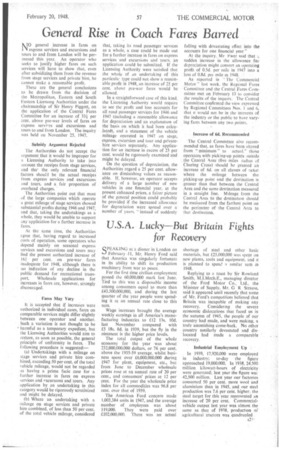General Rise in Coach Fares Barred
Page 27

If you've noticed an error in this article please click here to report it so we can fix it.
N°general increase in fares on express services and excursions and tours to and from London will be permined this year. An operator who seeks to justify higher fares on such services will have to show that, even after subsidizing them from the revenue from stage services and private hire, he cannot make a reasonable profit.
These are the general conclusions to be drawn from the decision of the Metropolitan, Eastern and South Eastern Licensing Authorities under the chairmanship of Sir Henry Piggott, on the application of the Central Fares Committee for an increase of 33i per cent. above pre-war levels of fares on express serviecs and excursions and tours to and from London. The inquiry was held on November 25, 1947.
Subsidy Argument Rejected The Authorities do not accept the argument that it would be improper for a Licensing Authority to take into account the receipts from stage services, and thee the only relevant financial factors should be the actual receipts from express services and excursions and tours, and a fair proportion of overhead charges.
The Authorities point out that most of the large companies which operate a great mileage of stage services showed substantial profits during 1946 and 1947; and that, taking the undertakings as a whole, they would be unable to support any application for a further increase in fares.
At the same time, the Authorities agree that, having regard to increased costs of operation, some operators who depend mainly on seasonal express services and excursions and tours may find the present authorized increase of 163 • per cent, on pre-war fares inadequate for 1948, although there is no incEcation of any decline in the public demand for recreational transport. Wholesale applications for increases in fares are, however, strongly discouraged.
Fares May Vary It is accepted that if increases were authorized in individual cases, fares on comparable services might differ slightly between one operator and another. Such a variation is not thought to be
• harmful as a temporary expedient, but the Licensing Authorities would aim to restore, as soon as possible, the general principle of uniformity in fares. The following procedure is suggested:—
(a) Undertakings with a mileage on stage services and private hire combined, exceeding 50 per cent, of the total vehicle mileage, would not be regarded as having a prima facie case for a further increase in fares on express services and excursion a and tours. Any application by an undertaking in this category would be rigorously scrutinized and might be delayed.
(b) Where an undertaking with a mileage on stage services and private hire combined, of less than 50 per cent. of the total vehicle mileage, considered that, taking its road passenger services as a whole, a case could be made out for a further increase in fares on express services and excursions and tours, an application could be submitted. If the Licensing Authority were satisfied that the whole of an undertaking of this particulse type could not show a reasonable profit in 1948, an increase of 25, per cent, above pre-war fares would be allowed.
In a straightforward case of this kind, the Licensing Authority would require to see the profit and loss accounts for all road passenger services for 1946 and 1947 (including a reasonable allowance for depreciation and an explanation of the basis on which it had been calculated), and a statement of the vehicle Mileage operated in 1947 on stage, express, excursion and tour and. privatehire services separately. Any applicationfor an increase in excess of 25 per cent would be rigorously examined and Might be delayed.
On the question of depreciation, the Authorities regard a 25 per cent, allowance on diminishing values as reasonable. If, however, an operator accepts delivery of a large number of new vehicles in one financial year, at the present enhanced prices, a fairer picture of the general position could probably be provided if the increased allowance for depreciation• were spread over a number of years, instead of suddenly falling with devastating effect into the accounts for one financial year "
At the inquiry, Mr Fwer said that sudden increase in the allowance -for depreciation might convert an operating profit of 0.5d. per mile in 1947 into a loss of 0.8d. per mile in 1948. •
As reported in "The Commercial Motor" last week. the Regional Fares Committee and the Central Tares Committee met on February 13 to consider the results-of the inquiry. The Central Committee confirmed the view expressed by Regional Committees Nos. 1 and 6, that it would not he in the interests Of the industry or the public to have varying fares between any two points.
Increase of 6d. Recommended The Central Committee also recommended that, as fares have been altered from '" minimum to actual." those operators with picking-up points outside the Central Area (five miles radius of Charing Cross) should be granted an increase of 6d. on all classes of ticket where the mileage between the picking-up point and the destination is .greater than that between. the Central Area and the same destination measured in a straight line. Mileage from the Central Area V) the destination Should be measured from the farthest point on the perimeter of the Central Area to that destination.




















































































